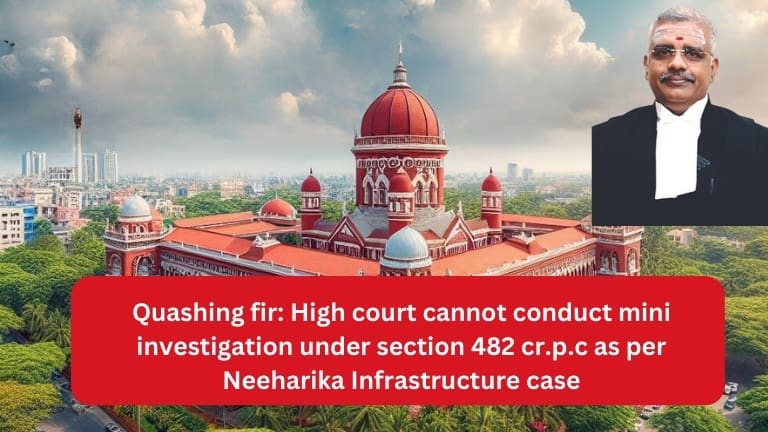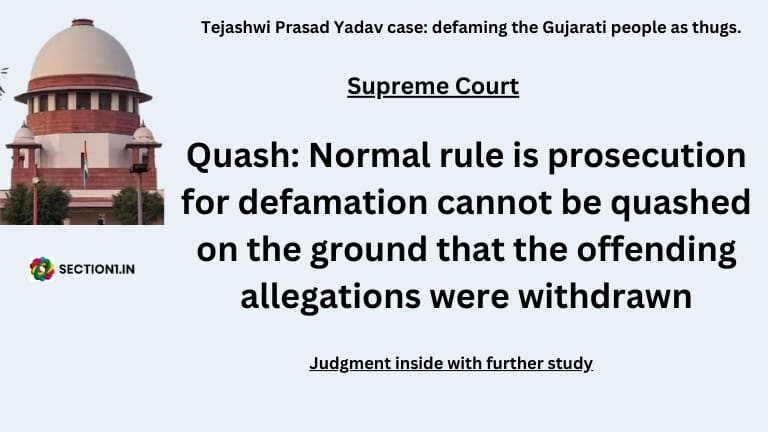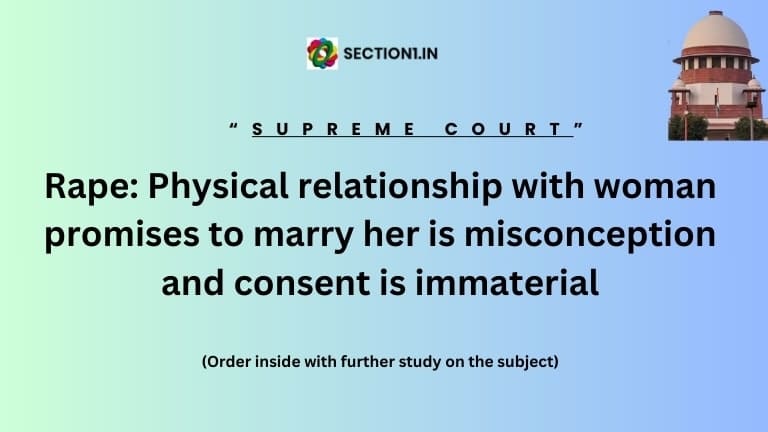Double Jeopardy – Explained in the eyes of section 300 Cr.P.C and Part-III Fundamental Rights, Constitution of India.
18. Before proceeding further, it is pertinent to understand the concept of double jeopardy. As per the Black’s Law Dictionary, 9th Edition, ‘double jeopardy’ is defined as “being prosecuted or sentenced twice, for substantially the same offence”.
19. The word ‘jeopardy’ is used to designate the danger of conviction and punishment which an accused in a criminal action incurs. ‘Jeopardy’ implies an exposure to a lawful conviction for an offence for which a person has already been acquitted or convicted. The terms ‘double jeopardy’, ‘former jeopardy’, ‘jeopardy for life or limb’, ‘jeopardy for the same offence’, ‘twice put in jeopardy of punishment’ and other similar expressions used in various Constitutions and statutes are to be construed substantially, to the same effect. In other words, double jeopardy is used to denote the protection to an accused, that he has had a fair trial for the same offence, wherein fair trial means trial according to law and established legal procedure.
20. Part III of the Constitution of India deals with Fundamental Rights. Articles 20 to 22 deal with personal liberty of citizens and others. Article 20(2) expressly provides that no person shall be prosecuted or punished for the same offence, more than once. The protection against double jeopardy is also supplemented by statutory provisions contained in Section 300 of the CrPC, Section 40 of the Indian Evidence Act, 1872, Section 71 of the IPC and Section 26 of the General Clauses Act, 1897. Article 20(2) of the Constitution of India.
22. Section 300 of the CrPC embodies the general rule which affirms the validity of the pleas of autrefois acquit (previously acquitted) and autrefois convict (previously convicted). Sub-section (1) of Section 300 lays down the rule of double jeopardy and sub-sections (2) to (5) deal with the exceptions. Accordingly, so long as an order of acquittal or conviction by a court of competent jurisdiction remains in force, the person cannot be tried for the same offence for which he was tried earlier or for any other offence arising from the same fact situation, except the cases dealt in with under sub-sections (2) to (5) of the section.
23. Section 300 of the CrPC is based on the maxim nemo deber bis vexari, si costest curiae quod sit pro una et eadem causa which means that a person cannot be tried a second time for an offence which is involved in an offence with which he was previously charged. As per the decision of this Court in Vijayalakshmi vs. Vasudevan (1994) 4 SCC 656 in order to bar the trial of any person already tried, it must be shown that: (i) he has been tried by a competent court for the same offence or one for which he might have been charged or convicted at a trial, on the same facts, (ii) he has been convicted or acquitted at the trial, and (iii) such conviction or acquittal is in force.
24. The whole basis for this provision is that the first trial should have been before court of competent jurisdiction. There must have been a trial of the accused, that is to say, that there should have been a hearing and determination or adjudication of the case on merits. Where the accused has not been tried and as such convicted or acquitted, Section 300(1) shall not be applicable.
25. Section 300 of the CrPC bars the trial of a person not only for the same offence but also for any other offence on the same facts, vide Thakur Ram vs. State of Bihar AIR 1966 SC 911.
Article 20 of the Constitution:
26. Under clause (2) of Article 20, no person shall be prosecuted and punished for the same offence more than once. Article 20(2) of the Constitution of India incorporates within its scope, the plea of autrefois convict, meaning, previously convicted as known to British jurisprudence, or the plea of double jeopardy known to the American Constitution. However, the said concepts are circumscribed in Article 20(2) which provides that there should be not only a prosecution but also punishment in the first instance in order to operate as a bar to a second prosecution and punishment for the same offence. On a plain reading the of sub clause (2) of Article 20, it is clear that the said provision bars a second prosecution only where the accused has been both prosecuted and punished for the same offence previously vide S.A. Venkataraman vs. Union of India AIR 1954 SC 375 (“S.A. Venkataraman”). But this clause does not bar subsequent trial if the ingredients of the offences in the previous and subsequent trials are distinct. In Maqbool Hussain vs. State of Bombay AIR 1953 SC 325, this Court has held that clause (2) is not applicable unless the person has been both prosecuted and punished.
27. There are three conditions for the application of the clause. Firstly, there must have been previous proceeding before a court of law or a judicial tribunal of competent jurisdiction in which the person must have been prosecuted. The said prosecution must be valid and not null and void or abortive. Secondly, the conviction or acquittal in the previous proceeding must be in force at the time of the second proceeding in relation to the same offence and same set of facts, for which he was prosecuted and punished in the first proceeding. Thirdly, the subsequent proceeding must be a fresh proceeding, where he is, for the second time, sought to be prosecuted and punished for the same offence and same set of facts. In other words, the clause has no application when the subsequent proceeding is a mere continuation of the previous proceeding, for example, where an appeal arises out of such acquittal or conviction. In order to sustain a plea of double jeopardy, it must be shown that all the aforesaid conditions of this clause are satisfied, vide S.A. Venkataraman.
28. What is to be noted here is that both these provisions, i.e., Section 300 of the CrPC and Article 20 of the Constitution of India use the term ‘same offence’. Before dealing with the issue at hand, it is necessary to understand what the term ‘same offence’ means and includes. The term ‘same offence’ in simple language means, where the offences are not distinct and the ingredients of the offences are identical. Where there are two distinct offences made up of different ingredients, the embargo under Article 20 of the Constitution of India, has no application, though the offences may have some overlapping features. The crucial requirement of Article 20 is that the offences are the same and identical in all respects, vide State (N.C.T. of Delhi) vs. Navjot Sandhu (2005) 11 SCC 600.
29. The concept of double jeopardy can also be understood in terms of Article 21 of the Constitution of India which states that no person shall be deprived of his life or personal liberty except according to procedure established by law. ‘Life’ under Article 21 of the Constitution is not merely the physical act of breathing. It does not connote mere animal existence or continued drudgery through life. It has a much wider connotation; it includes the right to live with human dignity. In the celebrated judgment in the case of Maneka Gandhi vs. Union of India 1978 AIR 597, this Court gave a new dimension to Article 21, wherein it stated that the right to live includes within its ambit the right to live with dignity. Under the umbrella of Article 21, various rights like right to free legal aid, right to speedy trial, right to fair trial, etc. have been included. Similarly, protection against double jeopardy is also included under the scope of Article 21 of the Constitution of India. Prosecuting a person for the same offence in same series of facts, for which he has previously either been acquitted or has been convicted and undergone the punishment, affects the person’s right to live with dignity.
30. Double jeopardy is often confused with double punishment. There is a vast difference between the two. Double punishment may arise when a person is convicted for two or more offences charged in one indictment however, the question of double jeopardy arises only when a second trial is sought on a subsequent indictment following a conviction or acquittal on an earlier indictment. This doctrine is certainly not a protection to the individual from peril of second sentence or punishment, nor to the service of a sentence for one offence, but is a protection against double jeopardy for the same offence that is, against a second trial for the same offence.
Facts of the present case – Acquittal
37. It is further the case of the appellant herein that the previous three cases, C.C. No.12, 13 and 14 of 1999 pertained to the period from 28.03.1994 to 02.04.1994, 15.12.1992 to 31.03.1993 and 05.03.1994 to 08.03.1994, respectively. Admittedly, the charge in C.C. No.24 of 2003 is for misappropriation of an amount of Rs.20,035/- during the period from 27.04.1992 to 25.08.1992; the charge in C.C. No.25 of 2003 is for an amount of Rs.58,671/-, allegedly misappropriated during the period from 01.03.1993 to 12.04.1994. It is appellant’s case that he has already faced trial in the previous three cases and the present two cases pertain to the same period. Section 300 of the CrPC places a bar wherein, a person who has already been tried by a Court of competent jurisdiction for an offence arising out of the same facts, and has either been acquitted or convicted of such offence cannot be tried again for the same offence as well as on the same facts for any other offence as long as such acquittal or conviction remains in force. The appellant herein was earlier charged for offences under Section 13(1)(c) read with Section 13(2) of the Act and Sections 409 and 477A of the IPC and was convicted in two cases and acquitted in one case. The present two cases arise out of the same set of facts and the same transaction as that in the previous three cases wherein the appellant was tried and convicted/acquitted respectively. As already discussed above, for an offence to be considered as the ‘same offence’ as the last offence, it is necessary to show that the offences are not distinct and the ingredients of the offences are identical. The previous charge as well as the present charge is for the same period of misappropriation. The matter of offences in all the previous three cases and the present case are the same and are said to be committed in the course of same transaction while holding the one and same post of Agricultural Officer by the appellant.
38. The Trial Court has erred in holding that the facts of previous case and misappropriation committed by the accused are not the same as the facts relevant to present case. The Trial Court has held that in the present case, the allegation is that after conducting the auction of coconuts and half filled grains, two-thirds of the amount collected from the successful bidder was not remitted to the treasury, however, in the earlier cases, the allegations were that the accused misappropriated some amount to be paid to the proprietor of Agricultural Marketing Corporation, Kozhikode, Kerala State Coir marketing Corporation, Kozhikode from the State Seed Farm, Perambra by forging and falsifying records. It is the admitted case of the prosecution that the present cases were based on the re-audit conducted by PW-9- the Assistant Sub-Inspector, Vigilance and Anti-Corruption Bureau, Kozhikode. The re-audit was done for the period from 01.04.1992 to 31.12.1994. The charges in the present case are for relevant period from 27.04.1992 to 25.08.1992 and 01.03.1993 to 12.04.1994 which time period is same as in the previous three cases, that is, 28.03.1994 to 02.04.1994, 15.12.1992 to 31.03.1993 and 05.03.1994 to 08.03.1994 respectively. Thus, it can be said that the present cases pertain to the same set of facts and are in respect of same offences, for the same period, committed in the same capacity as the previous three cases wherein the appellant herein was already prosecuted in the year 1999. The core allegation in all these five cases pertains to misappropriation by making false entries in the cash book. The allegation of the prosecution that two-thirds of the auction amount was not remitted to the treasury would be covered under the allegations of misappropriation of funds, that the appellant has already been prosecuted for in the year 1999. The appellant is right in contending that the charge in the first three cases were framed on 17.08.1999 which is much after the audit and the prosecution would have been well aware of the misappropriation in respect of the present cases on 17.08.1999.
39. The learned counsel for the appellant has also brought to the attention of this Court, sub-section (2) of Section 300 of the CrPC which states that a person acquitted or convicted of any offence may be tried thereafter, but with the consent of the State Government, for any distinct offence for which a separate charge might have been framed against him under sub-section (1) of Section 220 of the CrPC. It has already been observed hereinabove that the allegations/offences in the instant cases are the same as the allegations/offences in the previous three cases, therefore as per the mandate under Section 300(2) of the CrPC, the consent of the State Government is necessary. Even if it is assumed for the sake of argument that the allegations are different in present cases from those in the previous cases, the prosecution has failed to obtain the prior consent of the State Government necessary to prosecute the accused-appellant and therefore the trial in the instant case is unlawful.
40. It would not be wrong to say that the charges framed against the accused reveal that there were several acts of misappropriation and falsification of accounts however the same were committed in the same transaction as the one for which he was prosecuted in the year 1999. The series of acts alleged against him are so connected to one another.
41. Sub-section (2) of Section 300 of the CrPC states that when the charge of the second trial is for a distinct offence, the trial is not barred. This means that if a person is acquitted or convicted of any offence, he may be tried for a distinct offence for which a separate charge might have been made against him at the former trial under sub-section (1) of Section 220 of the CrPC but the same is subject to a condition precedent being, that the consent of the State Government is sought before such a person could be tried. Applying the said provision to the present case, it is noted that earlier the petitioner was tried in C.C. No.12 of 1999, C.C. No. 13 of 1999 and C.C. No.14 of 1999 for the offences under Section 13(1)(c) read with Section 13(2) of the Act as well as under Sections 409 and 477A of the IPC. In C.C. No. 24 of 2003 and C.C. No. 25 of 2003, the appellant is being tried once again for the offences under Section 13(1)(c) read with Section 13(2) of the Act and Section 409 of the IPC for the same period. There is no material on record to demonstrate that C.C. No.24 of 2003 and C.C. No.25 of 2003 have been initiated pursuant to the consent of the State Government. It is also not brought on record that the C.C. No.24 of 2003 and C.C. No.25 of 2003 is for any distinct offence for which a separate charge had been made against the appellant and the earlier trials. (a) Having re-appreciated the evidence of the witnesses and on considering the contentions of the rival parties, we find that the High Court was not justified in affirming the judgment of conviction and sentence passed by the Trial Court. (b) In view of the aforesaid discussion, we find that the Trial Court as well as the High Court were not right in convicting and sentencing 32 the appellant herein and therefore, the impugned judgments are liable to be set aside.
42. In the circumstances, we find that the initiation of C.C. No.24 of 2003 and C.C. No. 25 of 2003 are not in accordance with law and hence, the said proceedings are quashed. Consequently, the judgment of the Special Judge, Kozikhode in C.C. No.24 of 2003 and C.C. No.25 of 2003 and of the High Court of Kerala at Ernakulam in Criminal Appeal Nos.947 and 948 of 2009 are set aside.
T.P. Gopalakrishnan … APPELLANT(S) Vs. State of Kerala … RESPONDENT(S) – CRIMINAL APPEAL NOS.187-188 OF 2017.






